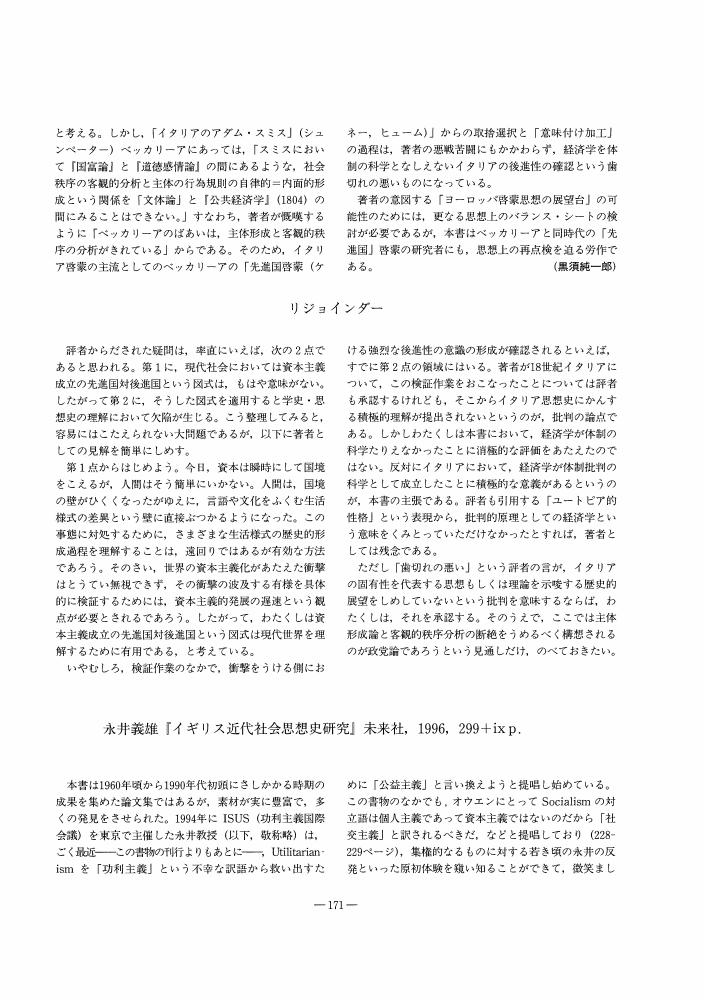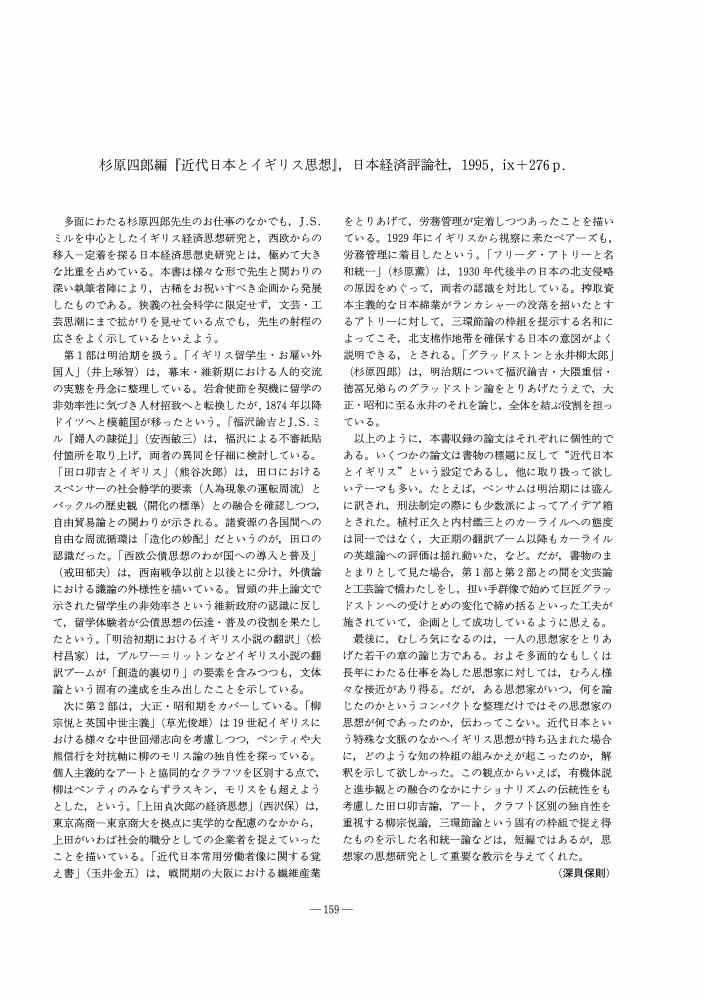3 0 0 0 近代国家の文化的アイデンティティ形成における古代表象の諸相
2 0 0 0 OA 永井義雄『イギリス近代社会思想史研究』未来社, 1996, 299+ixp.
- 著者
- 深貝 保則
- 出版者
- 経済学史学会
- 雑誌
- 経済学史学会年報 (ISSN:04534786)
- 巻号頁・発行日
- vol.35, no.35, pp.171-173, 1997 (Released:2010-08-05)
- 著者
- 小関 武史 深貝 保則 玉田 敦子 坂本 貴志 武田 将明 松波 京子 川名 雄一郎 長尾 伸一 屋敷 二郎 福島 知己 福田 名津子 逸見 竜生 坂倉 裕治 隠岐 さや香 飯田 賢穂
- 出版者
- 一橋大学
- 雑誌
- 基盤研究(B)
- 巻号頁・発行日
- 2019-04-01
18世紀西洋の啓蒙は、科学、技術から政治思想に至る広範な領域で、19世紀以後の知の原型を与えたと考えられてきた。また20世紀後半以後の「近代」批判に対しては、啓蒙の現代的意義が主張されてきた。他方近年の啓蒙研究は、膨大な資料の丹念な発掘と読解、あるいはデジタル化などの新技術に基づき、当時のテクストを時代の文脈の中に位置づけ、多様で複雑な知の在り方を明らかにしてきたが、現代思想における近代批判や啓蒙の再評価に応える統一的な像を提起するには至っていない。本研究は啓蒙研究の現段階の方法と成果を総合し、「浮動する知の境界」という視点から多方面の貴重資料の分析を行い、啓蒙の知の総合的な解釈を試みる。
- 著者
- 深貝 保則
- 出版者
- 国公私立大学図書館協力委員会
- 雑誌
- 大学図書館研究 (ISSN:03860507)
- 巻号頁・発行日
- vol.107, 2017
情報ネットワーク化の急速な進展のもとで,図書館の役割も学術研究の流儀も,相応に変化しつつある。図書館のスタッフたちは機関リポジトリの活用と並んで,電子的コンテンツのデータ登録について周到な工夫を施しつつある。だが,学術情報の共有について進展を図るという昨今の課題の遂行とともに,むしろそれ以上に,同時的双方向的に討論することが可能となったことの積極的な意味を捉えておくことが重要である。2回連載のこの論説の前半では,17世紀ヨーロッパを舞台とする科学革命以来の「知」の交換と公刊の様式の変遷に注目して,学術コミュニケーションの多層的な進展の可能性を考える。
- 著者
- 深貝 保則
- 出版者
- 経済学史学会
- 雑誌
- 経済学史学会年報 (ISSN:04534786)
- 巻号頁・発行日
- vol.35, no.35, pp.171-173, 1997
- 著者
- 深貝 保則
- 出版者
- The Japanese Society for the History of Economic Thought
- 雑誌
- 経済学史学会年報 (ISSN:04534786)
- 巻号頁・発行日
- vol.46, no.46, pp.119-121, 2004 (Released:2010-08-05)
1 0 0 0 OA 『重商主義再考』に対する3つのコメント
- 著者
- 深貝 保則
- 出版者
- The Japanese Society for the History of Economic Thought
- 雑誌
- 経済学史学会年報 (ISSN:04534786)
- 巻号頁・発行日
- vol.43, no.43, pp.128-131, 2003 (Released:2010-08-05)
- 参考文献数
- 8
- 著者
- 深貝 保則
- 出版者
- The Japanese Society for the History of Economic Thought
- 雑誌
- 経済学史学会年報 (ISSN:04534786)
- 巻号頁・発行日
- vol.37, no.37, pp.192-193, 1999 (Released:2010-08-05)
1 0 0 0 OA マルサス『人口論』初版における農業重視論
- 著者
- 深貝 保則
- 出版者
- The Japanese Society for the History of Economic Thought
- 雑誌
- 経済学史学会年報 (ISSN:04534786)
- 巻号頁・発行日
- vol.37, no.37, pp.57-69, 1999 (Released:2010-08-05)
- 参考文献数
- 21
Most of the recent research on Malthus's agricultural bias has suggested that Malthus present this physiocratic idea in his first Essay on Population (1798). However, when considering Malthus's evaluation of agriculture, it is important to make distinctions among his physiocratic inclination, his agrarian or agricultural bias, and his protectionism of agriculture. This paper demonstrates that his agricultural bias in the first Essay was non-physiocratic.First, his explanation differing from the normal physiocrats' explanation of the surplus as the ‘clear rent’, Malthus grasped the ‘surplus’ uniquely. He explained that, when the landlords obtain food, they secure their own food first, then the remaining ‘surplus of food’ can be allotted to the labourers. Second, Malthus opposed the physiocratic meaning of the productive-unproductive distinction between agriculture and manufacture. The emergency of obtaining food under condition of scarcity is considered to be crucial. In the case of scarcity, even the non-profitable agriculture should be preferred to the manufacture, because only the former can provide food for the poor; the latter simply provides luxuries for the rich. Utilizing this explanation, Malthus estimated only the agricultural as useful and ‘productive’. Recent research has misinterpreted these unique ideas presented in the first Essay of Population.
1 0 0 0 OA Roger E. Backhouse, Truth and Progress in Economic Knowledge Edward Elgar, 1997, xi+232p.
- 著者
- 深貝 保則
- 出版者
- The Japanese Society for the History of Economic Thought
- 雑誌
- 経済学史学会年報 (ISSN:04534786)
- 巻号頁・発行日
- vol.36, no.36, pp.189-191, 1998 (Released:2010-08-05)
1 0 0 0 OA 杉原四郎編『近代日本とイギリス思想』, 日本経済評論社, 1995, ix+276p.
- 著者
- 深貝 保則
- 出版者
- 経済学史学会
- 雑誌
- 経済学史学会年報 (ISSN:04534786)
- 巻号頁・発行日
- vol.34, no.34, pp.159, 1996 (Released:2010-08-05)
- 著者
- 深貝 保則
- 出版者
- The Japanese Society for the History of Economic Thought
- 雑誌
- 経済学史学会年報 (ISSN:04534786)
- 巻号頁・発行日
- vol.33, no.33, pp.169, 1995 (Released:2010-08-05)
1 0 0 0 OA 商業社会把握の政治的インプリケーション
- 著者
- 深貝 保則
- 出版者
- The Japanese Society for the History of Economic Thought
- 雑誌
- 経済学史学会年報 (ISSN:04534786)
- 巻号頁・発行日
- vol.30, no.30, pp.10-18, 1992 (Released:2010-08-05)
- 参考文献数
- 28
This article on British economic thought during the period from the late 1790's to early 1830's has two aims. The first is to investigate Malthus' economic thought in the context of the theology and his Whig inclinations. The second is to reveal the diversities in the understanding of ‘commercial society’ among his contemporaries.To begin with the latter point, the Edinburgh Review played an important role as the conveyer of the idea of the art of government and the analysis of ‘commercial society’ from the eighteenth-century Scottish tradition to the nineteenth-century British economic arguments. In this context, when Ricardo's Principles was published, McCulloch considered it not as the subsitution but as the compensation for Smith's Wealth of Nations. But in the decade of 1820's there were several points severely debated; for example, whether to accept the idea of the ‘conjectural history’, how to evaluate the result of the industrialization, and what kind of the position to be selected on the problem on Parliamentary Reform.In comparison with these arguments, Malthus' position is able to be characterized as that of medium. In some cases, Malthus judged on the political or economic problem not from the maximum of wealth but from that of happiness or safety. So, for Malthus, the concept of ‘proportions’ has the especial importance to the economic reasoning.
1 0 0 0 IR オイコス・ノモス,オイコノミア,エコノミー: 概念の生成論的検討・序説
- 著者
- 深貝 保則
- 出版者
- 横浜経済学会
- 雑誌
- エコノミア = Economia (ISSN:00129712)
- 巻号頁・発行日
- vol.64, no.1, pp.79-94, 2013-05-30
4年間の研究期間中に随時、Professor Micheal Freeden(オックスフォード大学マンスフィールド・コレッジ)およびProfessor Hansjorg Klausinger(ウィーン経済経営大学)の2名の海外共同研究者をはじめ、7ケ国15名の海外研究者の参加を得て、研究集会やセミナーなどを開催した。研究集会にあたっては当該の科学研究費補助金の研究組織メンバーをはじめ、国内の近接領域の研究者若干名も加わって、英文のペーパーによって討論をおこなった。19世紀の先進国のあいだでは「進歩」と「自由」を軸にした経済統治(経済についてのガヴァナンス)が比較的順調に進んだ。統一国家の形成それ自体が課題であったドイツやイタリア(および日本)は別格としても、原子論的・個人主義的社会像をベースにおいたブリテンや、実証主義を軸にエンジニア・エコノミストによる経済のアレンジを進めたフランスでは典型的に、進歩に信頼を寄せる方向にあった。しかし19世紀終盤になると、この枠組は大幅に修正を迫られた。現実的な歴史基盤の面でいえば、外交および経済を外延的に拡張させるストラテジーが相互に衝突を起こす可能性に直面しただけではない。各国の内包的な利害の面でも、産業化と都市化のうねりの帰結をめぐって社会階層間で、また一国経済の方向づけとその国際的連関のあり方をめぐって産業利害と金融利害との間で新たな調整を必要とする局面に差し掛かったからである。この研究課題の遂行を通じて、19世紀末からの局面転換を思想史的な観点から捉えた場合に、有機的なヴィジョンが持った構想力の重要性が確認された。T. H.グリーンやデュルケムに担われた有機体説的な社会観と、ダーウィンやスペンサーによって典型的に展開された進化論はともに、世紀転換期以降の社会のあり方や経済的な統治を構想する上で重要な役割を果たしたのである。







